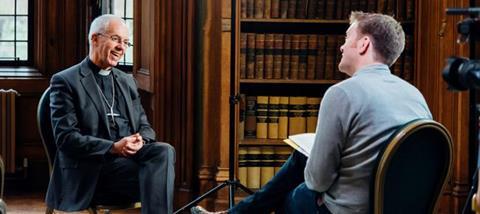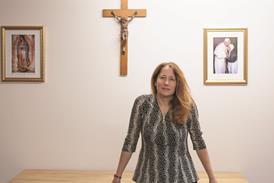
So Justin Welby, the Archbishop of Canterbury, prays in tongues every day as part of his morning devotions. Cue worried looks and raised eyebrows…
But when I asked him about his prayer life in an interview about Thy Kingdom Come this week, Justin Welby offered the information freely and as a fairly unremarkable fact about his daily morning routine. As natural as brushing his teeth, apparently.
“It’s not something to make a great song and dance about, given it’s usually extremely early in the morning it’s not usually an immensely ecstatic moment."
The Archbishop’s attitude, along with his openness to hearing from others through words of knowledge and prophecy, will be one shared by many Christians around the world, refreshed at hearing him voice what is also an important component of their own spiritual life.
Inevitably however, the secular world finds the idea of glossolalia (the technical term for speaking in tongues) an exotic and even worrying trend. Comments from sceptics underneath my tweet about the interview included “Nutters. Serious therapy required” and “For such an intelligent man he’s certainly got some nutty beliefs”.
In their article The Guardian commented that “His revelations may unnerve some traditional Anglicans.”
Perhaps they will. It’s also possible some Charismatic Anglicans might be unnerved by walking into a smells-and-bells Anglo Catholic Mass. But I doubt that anybody will actually freak out either way. These days most Christians are perfectly aware of the varied and distinct expressions of spirituality and worship that exist across denominations and within their own. Indeed, in this week of Prayer for Christian Unity believers across denominations are being encouraged to come together to affirm the truths that bind them together, despite their differences in liturgy and worship expressions.
Speaking in tongues is a lot more common than many outside observers might assume
In any case, speaking in tongues is a lot more common than many outside observers might assume. Often the gift is expressed in personal prayer and devotions. But you’ll also find it happening collectively in public across the world as every Sunday worshippers in many churches lift their voices to God. Justin Welby was a member of one such church, Holy Trinity Brompton, before he became ordained. Indeed, globally there are over half a billion charismatic and Pentecostal Christians, the fastest growing part of the church in the world.
So what is it like to speak in tongues?
I’ve heard it described as a way to experience an intimate connection with God, that shortcuts the need for language, echoing St Paul’s words in 1 Corinthians 14 “For anyone who speaks in a tongue does not speak to people but to God. Indeed, no one understands them; they utter mysteries by the Spirit.” Critics worry that this effectively involves surrendering the brain to an emotional experience. But such critiques usually come from those who have not experienced the gift themselves.
When speaking about the gift of tongues in a recent interview, Dr Michael Brown told me: “Its something you can control, as in stop and start. But you are not manufacturing the words.” Brown says that just as we might choose to speak in English or Spanish, he can decide to speak in tongues, allowing him to feel “a sense of depth of communion with God, a richness of the Spirit’s presence. Often out of that may lead me to pray in English from my understanding.”
Some Christians (who take a theological view known as cessationism) believe the gift of tongues was only given for the early church and is no longer in operation. Critics such as Pastor John Macarthur have devoted books and conferences to their concerns about “Charismania”.
Of course there can be excesses (just as there can be in any doctrinal position or worship expression) but, the reality is that the gift of tongues and prophecy never went away. Christians down the ages continued to practise it. The Pentecostal revivals of the 20th Century brought it back to the masses and now in the parts of the world where the Church is growing fastest - Africa, Latin America and China - it is an expression of faith that is used widely, and boldly.
So can the Charismatic / traditionalist divide in the Western church be overcome? Andrew Wilson certainly hopes so. In an article for this month's Premier Christianity magazine he writes, “If the church encompasses the whole body of Christ – cerebral and emotional, high and low context, introvert and extrovert, spontaneous and controlled – then local churches need to worship in ways that help everyone find joy in God, through Christ, by the Spirit.”
I’m sure the Archbishop of Canterbury would agree.
You can read the full interview with Justin Welby in a forthcoming issue of Premier Christianity magazine. Subscribe now!




























